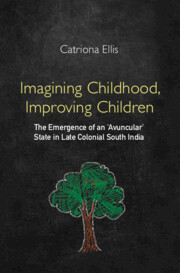
-
Select format
-
- Publisher:
- Cambridge University Press
- Publication date:
- 19 April 2023
- 24 August 2023
- ISBN:
- 9781009215213
- 9781009215206
- Dimensions:
- (229 x 152 mm)
- Weight & Pages:
- 0.57kg, 360 Pages
- Dimensions:
- Weight & Pages:
You may already have access via personal or institutional login
Book description
From as early as the 1920s, state policy towards children in South India was framed through the lens of a universal ideal of modern childhood. This reflected the participation of policy makers and civil society activists in global discourses of child-saving and the new opportunities of governance under the constitutional reforms of 1919. Children became viewed as both objects to be saved and investments as future citizens. The book considers how adults used this concept of universal childhood to conceptualise themselves as both modern and avuncular, gaining authority through an appropriation of familial terms as well as the claim to modern, scientific expertise. Through a detailed study of education, health and juvenile justice, the book reveals that the implementation of policy was still informed by other markers of difference, and contrasts adult intentions with the autobiographical memories of school, family, and peer relationships.
Reviews
‘This book represents a far-reaching and perceptive investigation into the making of childhood in late colonial Madras Presidency. Meticulously researched and very readable, it provides insightful and nuanced analysis of how debates around colonial modernity and indigenous familial relations and networks played out in constructions of childhood citizenship.'
Talat Ahmed - University of Edinburgh
‘A highly original and illuminating study on the development of a universal ideal of modern childhood in South India, dating back to the 1920s, when state policy toward children was shaped through a lens of child-saving and new experiences of governance. Employing child-centric theory, Ellis explores how policymakers viewed children as both objects to be saved and investments as future citizens. The book insightfully highlights the influence of caste, class, gender, and religion on childhood policies, exposing intellectual inconsistencies. Ellis also contrasts adult intentions and actions with the autobiographical memories of Indian childhoods, revealing the complex realities of childhood relationships with school, family, and peers. The book raises important new themes and agendas for the writing of Indian social history in the twentieth century.'
Crispin Bates - University of Edinburgh
Contents
Metrics
Altmetric attention score
Full text views
Full text views help Loading metrics...
Loading metrics...
* Views captured on Cambridge Core between #date#. This data will be updated every 24 hours.
Usage data cannot currently be displayed.
Accessibility standard: Unknown
Why this information is here
This section outlines the accessibility features of this content - including support for screen readers, full keyboard navigation and high-contrast display options. This may not be relevant for you.
Accessibility Information
Accessibility compliance for the HTML of this book is currently unknown and may be updated in the future.


